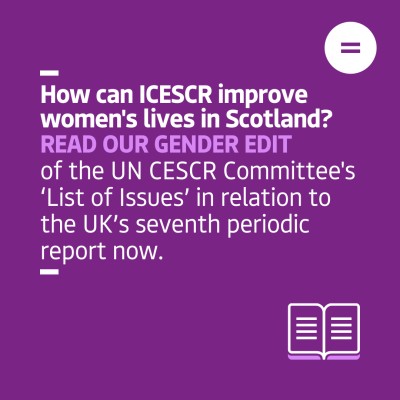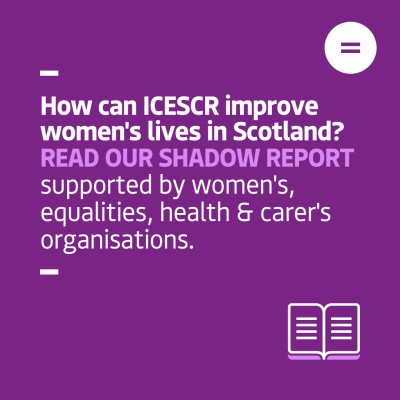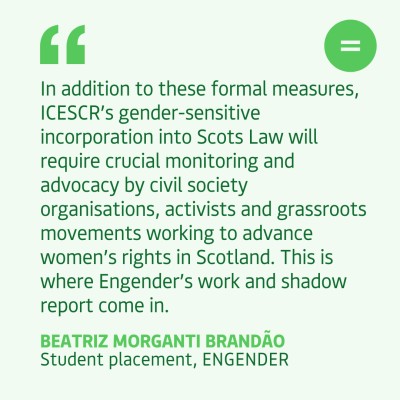Engender blog
Women's economic, social and cultural rights in Scotland

We recently submitted a shadow report, signed by 20 organisations, to the Seventh periodic report of the government of the United Kingdom on measures taken to give effect to ICESCR. In this blog, we share our gender edit of the List of Issues published by the CESCR Committee and take a look at some key issues raised.
The UN Committee on Economic Social and Cultural Rights is currently examining the UK on its performance under ICESCR (the International Covenant on Economic, Cultural, and Social rights). In 2022, the UK submitted its state party report (including input on devolved matters from Scottish Government), and the Committee received ‘shadow reports’ from civil society. Earlier this year we submitted a shadow report, co-signed by twenty organisations, which maps women’s rights in Scotland across the articles of ICESCR and highlights potential areas of focus for the Committee’s scrutiny. You can read more about our shadow report here.
How can ICESCR impact women's human rights in Scotland?

Engender recently joined with women's, equalities, health and carer's organisations to submit our shadow report to the Seventh periodic report of the government of the United Kingdom on measures taken to give effect to ICESCR. In this blog, we take a look at our submission and how ICESCR can be a key tool for improving women's lives in Scotland.
For many years, Engender and other women’s equality advocates have been campaigning for the incorporation of the UN Convention on the Elimination of all forms of Discrimination Against Women (often known as the ‘women’s bill of rights’) into Scots Law, but CEDAW isn’t the only UN Convention which is essential when it comes to the protection of women’s equality and rights. The International Covenant on Economic, Social and Cultural Rights (ICESCR), which ensures the enjoyment of economic, social and cultural rights, was adopted in 1966.
Engender’s shadow report to CESCR: a key tool for promoting a gender-sensitive incorporation of ICESCR and improving women’s lives in Scotland
For many years women's equality advocates have been campaigning for the incorporation of CEDAW into Scots Law, but that isn't the only UN Convention which is key for the protection of women's equality and rights. This final blog from student Beatriz Morganti Brandão sums up her work to explore how the International Covenant on Economic, Social and Cultural Rights can be used to protect women in Scotland.

For my final post, I want to share the main findings from the research report I prepared as part of my placement with Engender. Broadly speaking, the report aims to support Engender’s mission of enabling women’s rights in Scotland. Specifically, given the Scottish Government’s recent commitment to incorporate the International Covenant on Economic, Social and Cultural Rights (ICESCR or the Covenant) into Scots Law, the report focused on preparing a draft of Engender’s shadow report for the upcoming review by the UN Committee on Economic, Social and Cultural Rights (CESCR) of the UK Government’s seventh periodic report on measures taken to implement ICESCR, which includes Scotland-specific information. The idea is that, through this shadow report, Engender attracts international scrutiny over the economic, social and cultural rights-situation for women in Scotland, and influences a gender-sensitive incorporation of ICESCR that actually improves women’s lives in the country.
ICESCR’s incorporation into Scots Law: challenges and opportunities from a women’s rights perspective
-400.png)
For many years women's equality advocates have been campaigning for the incorporation of CEDAW into Scots Law, but that isn't the only UN Convention which is key for the protection of women's equality and rights. Engender is excited to be working with student Beatriz Morganti Brandão to explore how the International Covenant on Economic, Social and Cultural Rights can be used to protect women in Scotland. Here she explains more about what she'll be working on.
In March 2021, the Scottish Government announced its plans to adopt, by 2025, a landmark human rights bill that will incorporate four United Nations human rights treaties into Scots Law. Among these treaties is the International Covenant on Economic, Social and Cultural Rights (ICESCR), which establishes the rights to work, housing, health, education, social security, and many others covering basic needs.
Downloads
 Engender Briefing: Pension Credit Entitlement Changes
From 15 May 2019, new changes will be introduced which will require couples where one partner has reached state pension age and one has not (‘mixed age couples’) to claim universal credit (UC) instead of Pension Credit.
Engender Briefing: Pension Credit Entitlement Changes
From 15 May 2019, new changes will be introduced which will require couples where one partner has reached state pension age and one has not (‘mixed age couples’) to claim universal credit (UC) instead of Pension Credit.
 Engender Parliamentary Briefing: Condemnation of Misogyny, Racism, Harassment and Sexism
Engender welcomes this Scottish Parliament Debate on Condemnation of Misogyny, Racism, Harassment and Sexism and the opportunity to raise awareness of the ways in which women in Scotland’s inequality contributes to gender-based violence.
Engender Parliamentary Briefing: Condemnation of Misogyny, Racism, Harassment and Sexism
Engender welcomes this Scottish Parliament Debate on Condemnation of Misogyny, Racism, Harassment and Sexism and the opportunity to raise awareness of the ways in which women in Scotland’s inequality contributes to gender-based violence.
 Gender Matters in Social Security: Individual Payments of Universal Credit
A paper calling on the Scottish Government to automatically split payments of Universal Credit between couples, once this power is devolved to the Scottish Parliament.
Gender Matters in Social Security: Individual Payments of Universal Credit
A paper calling on the Scottish Government to automatically split payments of Universal Credit between couples, once this power is devolved to the Scottish Parliament.
 Gender Matters Manifesto: Twenty for 2016
This manifesto sets out measures that, with political will, can be taken over the next parliamentary term in pursuit of these goals.
Gender Matters Manifesto: Twenty for 2016
This manifesto sets out measures that, with political will, can be taken over the next parliamentary term in pursuit of these goals.
 Scottish NGO Briefing for UN Special Rapporteur on Violence Against Women
Joint briefing paper for the UN Rapporteur on Violence Against Women.
Scottish NGO Briefing for UN Special Rapporteur on Violence Against Women
Joint briefing paper for the UN Rapporteur on Violence Against Women.

Newsletter
Sign up to receive our newsletter here:
Sign up to our mailing list
Receive key feminist updates direct to your inbox: